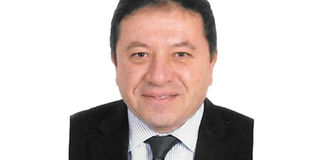Egypt makes stridesin fighting terrorism

Tarek sallam is the Egyptian Ambassador to Uganda
What you need to know:
- According to the source, security measures in the vicinity of major state institutions, houses of worship and tourist hotspots have been boosted.
- When analysing the outcome of counter-terrorism policies, many think-tanks in the West and terrorism scholars in Egypt focus only on security while ignoring other aspects of anti-terrorism policies.
On February 9, 2018, “the Comprehensive Military Operation Sinai 2018” was launched to purge terrorism from Sinai and put an end to this threat that has been on the rise since the Egyptian people sparked their June 30, 2013 Revolution to topple the Muslim Brotherhood rule and break apart their alliance with all terrorist and extremist groups.
The President, Abdel-Fattah El-Sisi, following with pride the heroics of the army and police in the Comprehensive Operation Sinai 2018, said “I follow with pride the heroics of my sons from the armed forces and the police to purge the beloved land of Egypt from terrorists, the enemies of life. And always, long live Egypt”. A senior Interior ministry security source said “the country’s security alert level has been raised to its highest level nationwide, in light of the “fierce war” by the police in coordination with the armed forces to eradicate “the roots of terrorism.” According to the source, security measures in the vicinity of major state institutions, houses of worship and tourist hotspots have been boosted.
Political solution: The Comprehensive Military Operation Sinai 2018, comes to crystallise the historical and constitutional role of the Egyptian Army being the shield and armour that protects the homeland, safeguards its security and preserve the integrity of its territories. On the other hand, “Sinai 2018” comes to unveil the blatant lies and sheer fraud harboured by the Muslim Brotherhood, its terrorist allies and the two countries that support them - lies that are blindly circulated by some international media claiming that the developmental role undertaken by the army overshadows its defensive role - a web of lies that has been demolished by “Sinai 2018”. Over the last four years, the Egyptian Army has relentlessly continued enhancing its operational combat capabilities, thus ranking for the first time as the 10th strongest army worldwide in 2017. Henceforth, this ranking stands as the clearest evidence that the Egyptian Army developmental role has never overshadowed its combat capabilities, bearing in mind the important fact that the Egyptian Army is an army composed only of Egypt’s sons.
It is both inconceivable and unreasonable to try to link the bloody terrorism that Egypt confronts inside and outside Sinai with thousands of causalities and injuries on one hand and what some media claim as “political solutions” to this heinous threat on the other hand with political solutions that these outlets falsely claim that the Egyptian State failed to adopt. When analysing the outcome of counter-terrorism policies, many think-tanks in the West and terrorism scholars in Egypt focus only on security while ignoring other aspects of anti-terrorism policies. The conclusion, therefore, is that terrorism is combated through “militarisation” and “security measures”.
Terrorism literature specifies three main domains of anti-terrorism policies. First, engaging with terrorist elements directly; second, dealing with terrorism victims; third, preventing the spread of terrorism through inoculating society through effective counter-terrorism programmes. When applying these three domains to Egypt’s anti-terrorism policies, we find there is real non-military and non-security work being done, but that it needs improvement. It is important to take these three factors into consideration when analysing last year’s efforts to combat terrorism. n the first domain, last year saw more raids and combat operations by security forces that led to pre-emptive attacks being planned by terrorist cells. Security agencies succeeded in dismantling terrorist cells focused on recruiting new members such as Amr Saad cell while continuing the state of emergency in North Sinai, engaging more air strikes targeting terrorists, and prosecuting more terrorist cases in court.
In the second domain, the government continued to pay monetary compensation to victims on a case-by-case basis.For example, after the attack on Al-Rawda Mosque in Beir Abd, president Al-Sisi ordered for payment of LE200,000 to the families of each of those killed, and LE50,000 to each injured victim. The Ministry of Education also waived fees in government schools for the children of those killed, and a decision was taken to prioritise hiring the offspring of martyrs in government offices.
In the third domain, inoculating society against extremism, which mostly focuses on addressing the causes of terrorism, existing efforts continue to deal with religious extremism as the main feature of the radicalism responsible for terrorist attacks. But this ignores the political and social dimensions of terrorism in most cases. Combating radical ideology on the Internet is a good example because it is necessary for these efforts to be comprehensive. However, that progress was made in how it views counter-terrorism, which is worthy of praise.
Mr Sallam is the Egyptian Ambassador to Uganda


